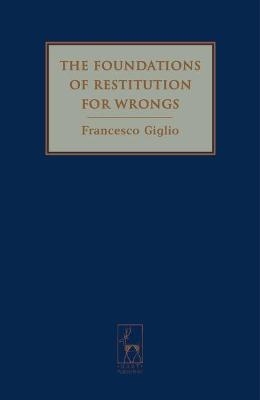
The Foundations of Restitution for Wrongs
Hart Publishing (Verlag)
978-1-84113-647-9 (ISBN)
'Restitution for wrongs', or 'restitutionary damages', is the judicial award which compels the wrongdoer to give up to the victim the benefit obtained through the perpetration of the wrong, independently of any loss suffered by the victim. The establishment of a civil trial in Roman law, which left compensation as the main response, and a widespread, loss-centred interpretation of the Aristotelian theory of corrective justice explain, but do not justify the difficulties encountered by modern attempts to account for restitutionary damages. Mistakes in the classification of this institution have complicated the picture. To overcome some of these problems, this study considers the basic structure of restitutionary damages from different angles. In part one, the topic is analysed from a comparative perspective. Although the focus remains on English law, the German, the Italian and the Roman jurisdictions provide research data which, in part two, support the development of a theory of restitution for wrongs as corrective justice.
Francesco Giglio is a Senior Lecturer in Law at the University of Manchester.
Introduction 1 Terminology and Introduction to the Concept of Restitution forWrongs I First Things First II Restitution III Wrong IV Setting the Terminological Premises 2 Restitution in the Context of the Law of Obligations I Legal Analysis II Some Remarks 3 Comparative Analysis: Proprietary and Intellectual PropertyWrongs I Organisation of the Analysis II Proprietary Wrongs III Intellectual Property Wrongs 4 Comparative Analysis: Breach of Contract I English Law II German Law III Italian Law 5 Comparative Analysis: OtherWrongs and Concluding Observations I Other Wrongs II Concluding Observations 6 The Roman Law of Damages I The Role of Non-Compensatory Responses II Legal Responses to Wrongs III The Punitive Character of the Roman Law of Delict IV Penal and Compensatory Actions VI Evolution of the Law of Damages in the Post-Classical Period VII The Law of Damages in the Ius Commune VIII Some Reflections 7 The Law of Damages in the Tradition of Aristotelian Philosophy I Introduction II The Aristotelian Approach to Responses to Wrongdoing III Aristotelian Theory and Law of Damages IV The Influence of Philosophical Analysis over Legal Interpretation 8 Modern Aristotelian Approaches to Restitution forWrongs I Introduction II German Legal Theory and Aristotelian Justice III A Moral Instrumentalist Theory on the Law of Damages IV A Moral Formalist Theory on the Law of Damages V Corrective Justice and Restitution for Wrongs 9 Wrongs and Restitution I Introduction II Birks' Three Tests III Protection of Facilitative Institutions IV General Acceptance V Position of the Law Commission VI Restitution Disgorgement and Deterrence VII The Requirements of the Claim VIII The Object of the Restitutionary Claim IX Election between Compensation and Restitution X The Neutrality of Restitution for Wrongs XI The A Fortiori Argument XII Conclusions 10 Final Observations I The Outcome of the Research II The Chosen Avenue III Law of Obligations and Restitution for Wrongs IV The Comparative Perspective V The Historical Perspective VI The Philosophical Perspective
| Erscheint lt. Verlag | 6.3.2007 |
|---|---|
| Verlagsort | Oxford |
| Sprache | englisch |
| Maße | 156 x 234 mm |
| Themenwelt | Recht / Steuern ► EU / Internationales Recht |
| Recht / Steuern ► Privatrecht / Bürgerliches Recht ► Besonderes Schuldrecht | |
| ISBN-10 | 1-84113-647-6 / 1841136476 |
| ISBN-13 | 978-1-84113-647-9 / 9781841136479 |
| Zustand | Neuware |
| Haben Sie eine Frage zum Produkt? |
aus dem Bereich


